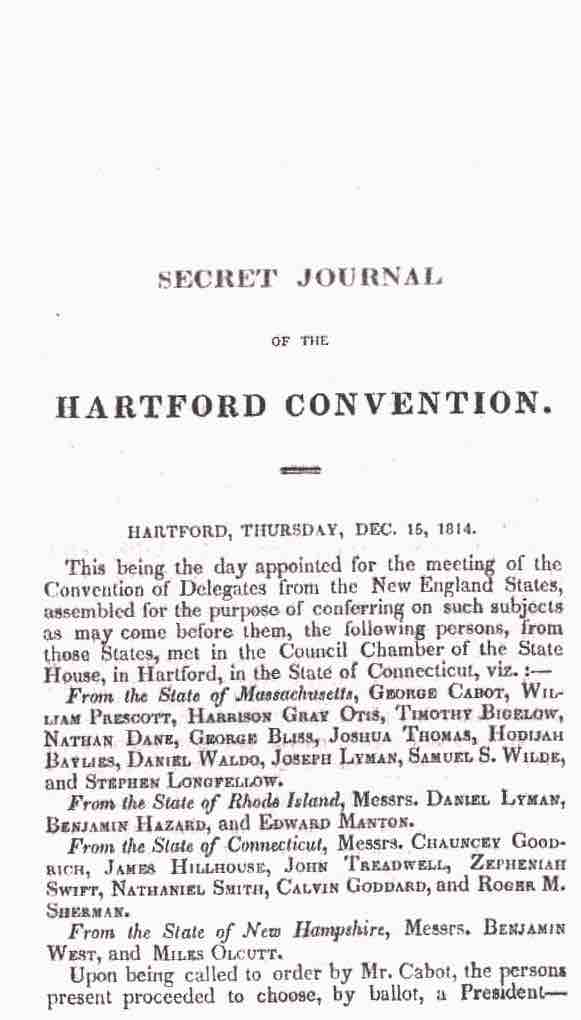Introduction
The Hartford Convention was an event in 1814–1815 in the United States in which New England Federalists met to discuss their grievances concerning the ongoing War of 1812, as well as the political problems arising from the domination of the federal government by presidents from Virginia. Despite many outcries in the Federalist press for New England secession and a separate peace with Great Britain, moderates dominated the Convention, and such extreme proposals were not a major focus of the Convention's debate.
Background
The War of 1812 was very unpopular in New England because it inflicted further economic harm on a region dependent on maritime commerce. This unpopularity caused a resurgence of the Federalist Party in New England. Many Federalists deeply resented the power of the slaveholding Virginian presidents Jefferson and then Madison, who appeared indifferent to their region. The depth of the Federalists’ discontent became evident when twenty-six Federalists met in Connecticut in December of 1814 for the Hartford Convention.
In response to the war crisis, Governor Strong of Massachusetts called the newly elected General Court to a special session on October 5, 1814. Strong's message to the legislature was referred to a joint committee headed by Harrison Gray Otis, who was considered a moderate. His report, delivered three days later, called for resisting any British invasion, criticized the leadership that had brought the nation close to disaster, and called for a convention of New England states to deal with their common grievances and common defense. Otis' report was passed by the state Senate on October 12 and by the House on October 16.
The Convention
The Hartford Convention met between December 1814 and early 1815 and included delegates from Massachusetts, New Hampshire, Vermont, Rhode Island, and Connecticut. The Convention discussed removing the three-fifths compromise, which gave slave states more power in Congress; they also discussed requiring a two-thirds super majority in Congress for the admission of new states, declarations of war, and laws restricting trade. The Federalists discussed their grievances with the Louisiana Purchase and the Embargo of 1807. Some attendees issued calls for New England to secede from the United States.
The convention ended with a report and resolutions, signed by the delegates present and adopted on the day before final adjournment. The report said that New England had a "duty" to assert its authority over unconstitutional infringements on its sovereignty—a doctrine that echoed the policy of Jefferson and Madison in 1798 in the Kentucky and Virginia Resolutions.
The Hartford Convention's final report proposed several amendments to the U.S. Constitution. These attempted to combat the policies of the ruling Democratic-Republicans by accomplishing the following:
- Prohibiting any trade embargo lasting more than 60 days;
- Requiring a two-thirds Congressional majority for declaration of offensive war, admission of a new state, or interdiction of foreign commerce;
- Removing the three-fifths representation advantage of the South;
- Limiting future presidents to one term; and
- Requiring each president to be from a different state than his predecessor. (This provision was aimed directly at Virginia's dominance of the presidency since 1800.)
Negative Reception
These arguments for disunion during wartime, combined with the Convention’s condemnation of the government, made Federalists appear unpatriotic to the Democratic-Republicans. Just weeks after the Convention's end, news of Andrew Jackson's overwhelming victory over the British in New Orleans (though exaggerated) swept over the Northeast, and the War of 1812 came to an end. This changed public sentiment toward the current administration and discredited the complaints of the Federalists, contributing to their final downfall as a major national political force.

Proceedings of the Hartford Convention
This image shows a page from Theodore Lyman's 1823 book on the Hartford Convention that lists the names of New England delegates who attended the meeting.